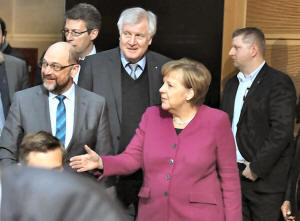|
Merkel's conservatives make big
concessions to SPD in coalition deal
 Send a link to a friend
Send a link to a friend
 [February 07, 2018]
By Andreas Rinke and Michelle Martin [February 07, 2018]
By Andreas Rinke and Michelle Martin
BERLIN (Reuters) - German Chancellor Angela
Merkel's conservatives and the Social Democrats (SPD) on Wednesday
agreed to a coalition deal, taking Europe's economic powerhouse closer
to a new government after months of uncertainty that unnerved allies and
investors.
In a move likely to mean a shift in Germany's euro zone policy, media
reported the SPD would take the finance ministry, a post held until
recently by conservative Wolfgang Schaeuble, widely despised in
struggling euro zone states during his eight-year tenure for his rigid
focus on fiscal discipline.
SPD leader Martin Schulz said earlier this week that his party had
ensured an agreement with the conservatives would put an end to "forced
austerity" and set up an investment budget for the euro zone.
Handing over the crucial finance ministry suggests the conservatives had
to make big concessions to get the SPD to agree to renew the 'grand
coalition' that has governed Germany since 2013 and secure Merkel's
fourth term in office.
Bruised by its worst election result in the post-war era, the SPD had
planned to revamp itself in opposition and only agreed to the coalition
talks reluctantly. Its 464,000 members still have the chance to veto the
deal in a postal ballot.

While the talks have dragged on, Europe's biggest economy has moved into
overdrive, suggesting that there may be increased scope for government
spending and investment.
In a message posted alongside a photo of Schulz and other SPD
negotiators smiling, the SPD negotiators wrote: "Tired but happy. There
is a treaty! Finally. Now the final details are being worked into the
text."
The agreement should allow German to resume its leading role in
international affairs and, at least for now, put an end to questions
about how long Merkel will stay in her job.
The full set of 91 negotiators were to meet at 2 p.m. (1300 GMT) to give
the deal the green light, negotiators said.
MULTIPLE CHALLENGES
Investors and partner countries had been concerned by Merkel's failure
to assemble a government in more than four months at a time when Europe
faces multiple challenges, including the need for euro zone reform and
Britain's looming departure from the EU.
A negotiating source said the SPD would have the finance and labor
ministries while media reported the party would also secure the justice,
family and environment ministries.
Bild newspaper reported that Schulz would become foreign minister,
despite having previously vowed not to take a cabinet position under
Merkel. Newspaper Sueddeutsche Zeitung said Schulz would quit as SPD
leader and parliamentary floor leader Andrea Nahles was ready to take
over.
Hamburg Mayor Olaf Scholz is slated to take over as finance minister,
according to sources familiar with the negotiations.

Merkel's Christian Democrats (CDU) will get the economy and defense
ministries while their Bavarian allies, the Christian Social Union
(CSU), will provide the interior minister in the form of Horst Seehofer,
who talks tough on migration, media reported. The news agency DPA said
the conservative acting finance minister, Peter Altmaier, would become
economy minister.
The conservative bloc and the SPD began talks about renewing their
alliance after Merkel's coalition talks with two smaller parties
collapsed last November. Both camps have seen their support wane.
An Insa poll on Monday had support for the SPD dropping to 17 percent,
below its election result of 20.5 percent. The conservatives slipped to
30.5 percent, suggesting there would be no majority for a grand
coalition if an election were held now.
[to top of second column]
|

Social Democratic Party (SPD) leader Martin Schulz (L to R), leader
of the Christian Social Union (CSU) Horst Seehofer and German
Chancellor Angela Merkel of the Christian Democratic Union (CDU)
arrive for coalition talks at the Social Democratic Party (SPD)
headquarters in Berlin, Germany February 2, 2018. REUTERS/Christian
Mang

The two blocs had aimed to strike a deal on Sunday, but repeatedly
extended that deadline as they grappled with reforms to health
insurance and employment policy demanded by the SPD.
LABOR MEASURES
After a marathon all-night session, the parties ultimately agreed to
cap at 18 months fixed-term contracts imposed by employers without
justification, down from 24 months under current rules, a source
involved in coalition negotiations said. The source said they also
agreed to ban the endless renewal of such contracts.
The SPD had wanted to give employees more security by totally
banning employers from imposing short-term contracts without
justification. But conservatives balked, arguing that firms needed
hiring and firing flexibility to be competitive.
On healthcare, the parties agreed to set up a commission to work on
a joint fee structure for private and public patients, a negotiating
source said, adding that whether it was ultimately introduced would
depend on its feasibility.
Doctors tend to get more money for treating private patients under
the current system, so often favor them over public patients.
Florian Hense, an economist at Berenberg, said the labor and
healthcare reforms, along with more generous pension entitlements,
could be expensive. "Germany may pay a price for them with slightly
reduced trend growth and a less solidly financed budget after the
next recession."

That prospect may be a way off, however. The DIHK Chambers of
Industry and Commerce raised its 2018 growth forecast for the German
economy to a robust 2.7 percent.
Record-high employment, increased job security, rising real wages
and low borrowing costs have helped to spur a consumer-led upswing,
strengthened recently by a rebound in exports and company
investments.
"Companies have never been more upbeat," DIHK said in its latest
business survey, adding that German firms are boosting investment
plans at an unprecedented pace.
Alice Weidel, leader of the far-right Alternative for Germany (AfD),
the biggest opposition party, tweeted: "Things could not get worse
for Germany," calling the coalition deal "insane" as it did not
contain an upper limit for migration.
(Additional reporting by Holger Hansen, Thorsten Severin and Andrea
Shalal; Writing by Michelle Martin; Editing by Kevin Liffey)
[© 2018 Thomson Reuters. All rights
reserved.]
Copyright 2018 Reuters. All rights reserved. This material may not be published,
broadcast, rewritten or redistributed.
Thompson Reuters is solely responsible for this content.
 |